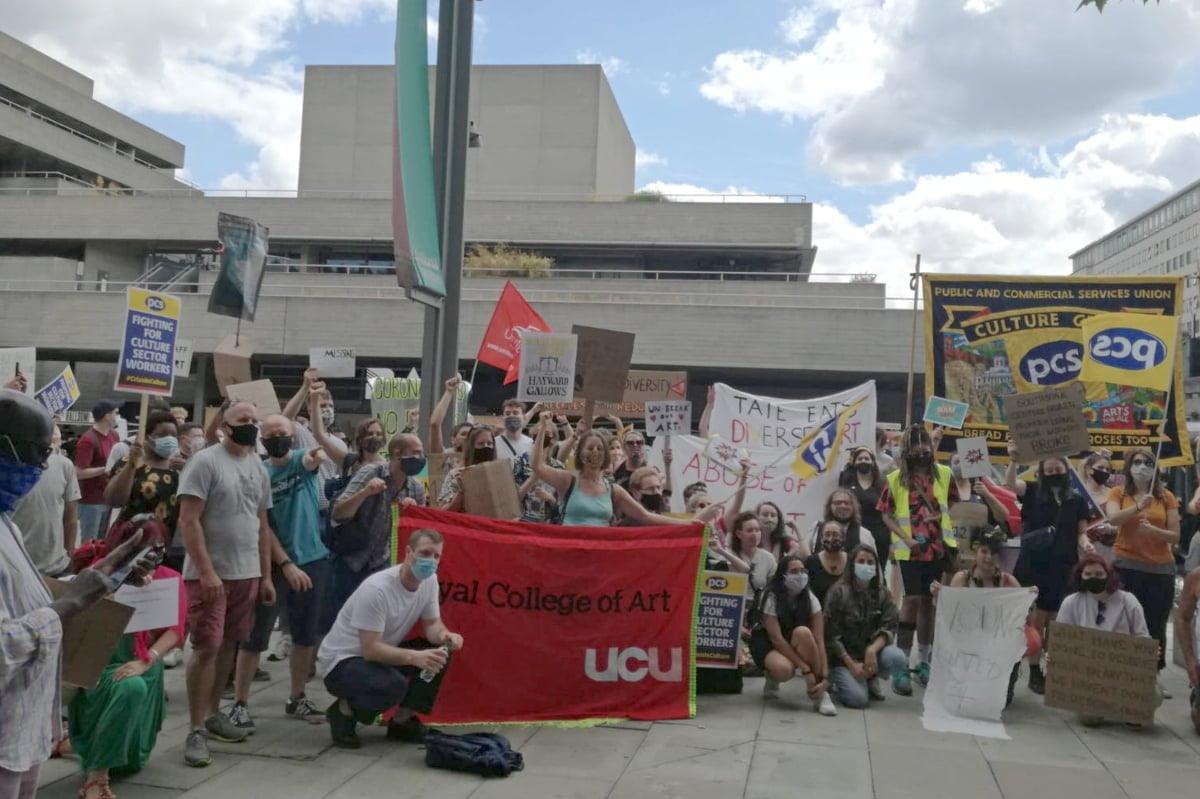The arts and culture sector has been hit hard by the pandemic. As ever, it is the workers in this industry who are being made to pay for this crisis. But they are not taking these attacks lying down, and are organising a fightback.
The Southbank Centre in London, Europe’s largest centre for the arts, has announced that it will not be reopening until April 2021. As a result, management will be making 356 redundancies out of a total of 577 staff members. This is over 50% of Southbank workers, including almost the entirety of the front of house staff.
Those keeping their jobs are those on the highest pay in positions of management. This shows clearly what the priorities are for those at the top.
The full extent of the capitalist crisis is yet to be felt. Due to months of lockdown and billions in state spending, the economy has so far largely been on pause, suspended in mid-air. Now that businesses are beginning to trade again, however, their financial life-support is being withdrawn – and they are looking down into an abyss.
As we have reported previously, the arts and culture sector is being hit particularly hard by the pandemic. The government has provided some emergency funding for the arts, but nowhere near enough. The amounts pledged – around £1.6 billion spread across the entire industry – are peanuts compared to the scale of the problem; or relative to the lavish sums used to bail out big business.
Militancy
The National Theatre, next door to the Southbank Centre, has also announced 400 redundancies to staff on casual contracts.
Workers from both institutions held a joint demonstration against the redundancies on Saturday 1st August on the Southbank, organised by the PCS union. 200 workers at the Southbank Centre are unionised with PCS, along with another 200 in Unite. Members from both unions are working together on the campaign.
Around 200 workers were present at the demonstration. There were several speakers addressing the crowd. The mood of the speeches was one of anger and militancy. But none of the workers present seemed remotely surprised by their mistreatment. Years of casualised contracts, poor working conditions, and bad management have hardened the mood and attitude amongst workers.
One speaker used his time on the megaphone very well to raise important class questions with the crowd. He referred to the working class and our need for unity. “By working class,” he stated, “I don’t mean the stereotypes we are given by the media, but those of us who sell our labour.”
Unity
Socialist Appeal supporters approached this speaker for an interview. The comrade explained that the situation being faced by the workers at the Southbank Centre and the National Theatre is not unique.
The activist also told us that workplace reps from different unions and different cultural institutions have been building a network across London. The aim is for workers to utilise their full strength across the sector, instead of holding isolated strikes and demonstrations.
“We thought instead of founding another union, i.e. the culture workers’ union, the thing to do was to hear that militancy where it was happening. And we started…we contacted the rep we knew on Twitter, and said do you want to hang out for a bit? And we built like that over time and we built through educational events…And then COVID hit us…
“As a group, we were about two things, really. One was to support each other’s protests and strikes. And the second was the face-to-face education stuff, which obviously fell off. We had a bit of a hiatus, honestly. But yeah, now we’re back. Although it’s just the shop stewards at the moment.”
Organisation
The next major development is that workers at the Tate art galleries will be balloting for strike action. As our interviewee informed us:
As our interviewee informed us:
“Tate have got their ballot coming back on Monday, and are quite optimistic about it. Hoping for a strike, a good strike in the second half of the month…
“And then, when it comes to workers, they’re organised. They are actually mounting a campaign against the job losses. They haven’t got long – I think it’s about a month in the case of the Tate – before people start losing their jobs.
“But my thinking is that if enough pressure can be put on the board through events like this, through the media, etc., the management board will either fund the money from their own budget, or get more from the state.”
What is clear from the developing situation is that workers are getting organised. The arts sector is beginning to demonstrate to workers the depth of the economic crisis and the ruthlessness of the bosses.
As workers, we can only rely on ourselves. And our only defence is our organisation and our unity.
The task ahead is to go from defensive strikes and demonstrations onto an offensive against the bosses – and to link these struggles into a fight for socialist policies that will make the capitalists, not workers, pay for this crisis.
For more information, and to support the Southbank SOS campaign, please click here.







